When the Shogunates greatest secret is stolen, the fate of the nation hangs in the balance. The Shogunate sends an incompetent cop, Tanaka, to Kyoto to act as a stalking horse. Hoping the thieves will kill Tanaka and the Ninja Spies will kill the thieves. But what the Shogunate doesn't realise is that Tanaka's even more incompetent assistant Mondo is in fact the leader of a gang of revengers for hire, there motto is "Sure Death" (or your money cheerfully refunded). Mondo doesn't know that everyone knows about the secret, but they all think he does. Poor Mondo, he not only has to deal with crazed Shogunate extremists, oddball ninjas, crooks who work for the Emperor and bicycle riding foreign death squads. He also have to deal with a wife and a crazy mother-in-law!
Related Movies
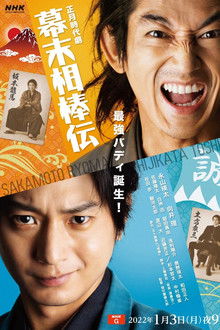
Bakumatsu Aibou-den (2022)
A single bullet cuts through Kyoto in the last days of the Tokugawa shogunate right before the restoration of imperial rule. Who plotted to assassinate Tokugawa Yoshinobu, who is about to become the last shogun of Japan? Was it the faction wanting to overthrow him or the rebels within the shogunate? Mutual enemies Sakamoto Ryoma, the wandering samurai, and Hijikata Toshizo, a deputy leader of the Shinsengumi and vassal of the Tokugawa clan, receive a secret order to track down the culprit. They are given a mere two days.

Kagemusha (1980)
Akira Kurosawa's lauded feudal epic presents the tale of a petty thief who is recruited to impersonate Shingen, an aging warlord, in order to avoid attacks by competing clans. When Shingen dies, his generals reluctantly agree to have the impostor take over as the powerful ruler. He soon begins to appreciate life as Shingen, but his commitment to the role is tested when he must lead his troops into battle against the forces of a rival warlord.
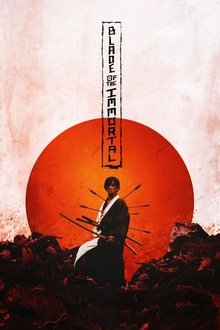
Blade of the Immortal (2017)
Manji, a highly skilled samurai, becomes cursed with immortality after a legendary battle. Haunted by the brutal murder of his sister, Manji knows that only fighting evil will regain his soul. He promises to help a young girl named Rin avenge her parents, who were killed by a group of master swordsmen led by ruthless warrior Anotsu. The mission will change Manji in ways he could never imagine.
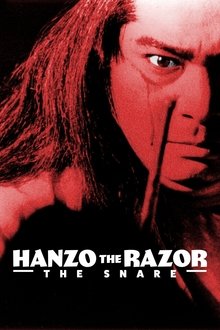
Hanzo the Razor: The Snare (1973)
Against the backdrop of the Edo treasury devaluing currency and driving many into poverty, Hanzo Itami enforces the law without regard to status. He shows inadequate respect to the treasurer, who wants him dead.
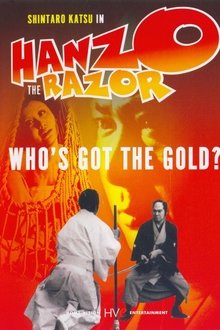
Hanzo the Razor: Who's Got the Gold? (1974)
Hanzo extracts a confession from a ghost using his assaulting methods, foils thieves, connects with Heisuke Takei a friend from his youth, offers protection to a forward-thinking physician Genan Sugino who has defamed his ruler, discovers a pleasure ring of young wives and a blind music teacher, and cuckolds a corrupt official under his very nose.

Bushido (2024)
Kakunoshin Yanagida (Tsuyoshi Kusanagi) was a samurai, but he was forced out of the Han due to a false accusation. He then lived in poverty with his daughter Kinu (Kaya Kiyohara). Despite being poor, he never gave up his pride and honor that he held as a samurai. Even when playing the board game Go, which is his hobby, he always plays in a fair manner. Because of a case, the truth behind the false accusation is revealed. Kakunoshin Yanagida is shaken and filled with rage. He decides to take revenge, even if it means he will be torn from his daughter.
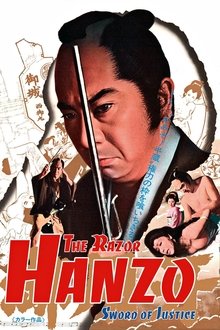
Hanzo the Razor: Sword of Justice (1972)
Fearless Edo-period police inspector Hanzo Itami, nicknamed The Razor, has developed his own unique way of extracting information for his inquiries. His first adventure sees him investigating his superior officer's mistress, whom he suspects of having ties with a reputed criminal on the loose.
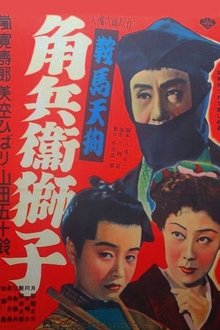
Kurama Tengu: Acrobat in a lion mask (1951)
Two child performers lose their money, but are saved by the masked avenger Kurama Tengu. When the children return the favor in foiling an attempt on the hero's life, they find themselves in need of protection once again...

Ran (1985)
With Ran, legendary director Akira Kurosawa reimagines Shakespeare's King Lear as a singular historical epic set in sixteenth-century Japan. Majestic in scope, the film is Kurosawa's late-life masterpiece, a profound examination of the folly of war and the crumbling of one family under the weight of betrayal, greed, and the insatiable thirst for power.
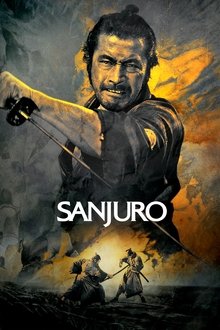
Sanjuro (1962)
Toshiro Mifune swaggers and snarls to brilliant comic effect in Kurosawa's tightly paced, beautifully composed "Sanjuro." In this companion piece and sequel to "Yojimbo," jaded samurai Sanjuro helps an idealistic group of young warriors weed out their clan's evil influences, and in the process turns their image of a proper samurai on its ear.
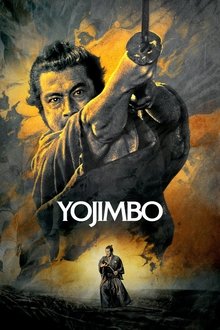
Yojimbo (1961)
A nameless ronin, or samurai with no master, enters a small village in feudal Japan where two rival businessmen are struggling for control of the local gambling trade. Taking the name Sanjuro Kuwabatake, the ronin convinces both silk merchant Tazaemon and sake merchant Tokuemon to hire him as a personal bodyguard, then artfully sets in motion a full-scale gang war between the two ambitious and unscrupulous men.
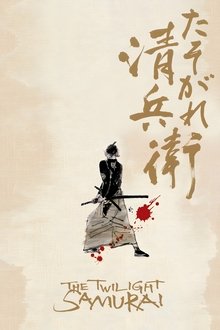
The Twilight Samurai (2002)
Seibei Iguchi leads a difficult life as a low ranking samurai at the turn of the nineteenth century. A widower with a meager income, Seibei struggles to take care of his two daughters and senile mother. New prospects seem to open up when the beautiful Tomoe, a childhood friend, comes back into he and his daughters' life, but as the Japanese feudal system unravels, Seibei is still bound by the code of honor of the samurai and by his own sense of social precedence. How can he find a way to do what is best for those he loves?
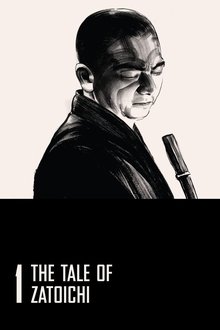
The Tale of Zatoichi (1962)
The adventures of a blind, gambling masseur and master swordsman. Zatoichi targets a yakuza-controlled village, because war with a neighbouring town's smaller gang is brewing.
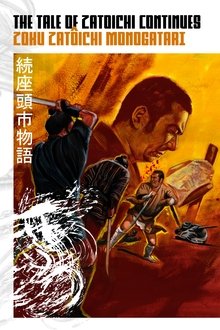
The Tale of Zatoichi Continues (1962)
Returning to the village where a year before he had killed Hirate, a much-admired opponent, Zatoichi encounters another swordsman and former rival in love.

Hanzo: The Razor (1984)
A pair of black-robed thieves who robbed many wealthy merchants in Edo one after another. One of them is a young woman who is called "Aoi no Kozo" because she always takes off her skin to show the tattoo on her back. The target of the robbers was the Kogi, and in particular, the big stores that were under the control of Hotta Bizen. Itami Hanzo, a Doshin known as "Kamisori Hanzo" discovers when he tracks down the Aoi no Kozo! What is the truth?!

Iwane: Sword of Serenity (2019)
Iwane Sakazaki returns to his homeland and gets caught in the middle of an incident that results in the tragic death of two of his best friends from childhood. He decides to leave his domain, parting with his fiancée Nao, and becomes a vagrant masterless samurai with nothing more to lose. Iwane drifts to Edo, filleting eels during the day and working as a bodyguard at night for Imazuya, a reputable money exchanger. He gradually wins the trust of the people around him because of his mellow nature, the chivalrous way he treats everyone with courtesy, and his skills of swords. One day, he learns that Imazuya is being targeted in a conspiracy to sabotage a new monetary system implemented by the government, and Iwane decides to protect the people who have given him support.
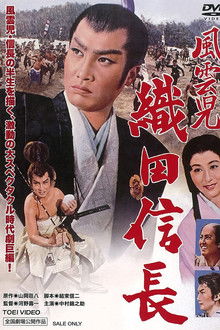
Lucky Adventurer Nobunaga Oda (1959)
Oda Nobunaga (1534–1582) was a major daimyo during the Warring State period of Japanese history. He was the second son of Oda Nobuhide, a deputy military governor with land holdings in Owari province. Nobunaga lived a life of continuous military conquest, eventually conquering a third of Japanese daimyo before his death in 1582. Telling the story of his rise to prominence as he leads an army of 4,000 men against the 40,000 troops of Lord Imagawa Yoshimoto to prevent the arrogant daimyo from crushing the Oda clan and taking control of the entire nation. From a newly restored anamorpic widescreen print, this is the ultimate warlord movie.
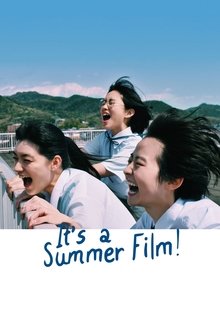
It's a Summer Film! (2021)
Barefoot and her friends decide to make a samurai movie, gather a unique cast and staff for the production, and try to screen it at their school festival.

Musashi (2019)
Musashi returns Japan's legendary swordsman and philosopher to the screen once again. In an original period drama based on the historical facts of the life and travels of the famous Miyamoto Musashi we find an apprentice, an instructor and the account of a famous battle in Japan of the Middle Ages where many questions will be answered.
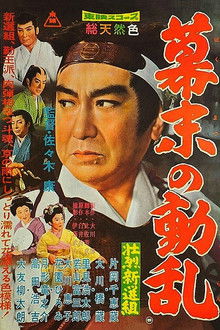
The Shogun’s Guard: Valor in Turbulence (1960)
The stormy tale of the Shinsengumi is told from its birth by master filmmaker Sasaki Yasushi, with an all-star cast based on the original story by Shirai Kyoji. The battles between the royalists and Shogunate supporters come to a fever pitch during the Gion Festival as the exclusionists plot to burn Kyoto and kidnap the Emperor. From its earliest beginnings as a group of ronin brought from Edo to protect the Shogun when he is in Kyoto to see His Imperial Highness, the group had to face difficulties both from within and without. Commander Serizawa Kamo's corrupt practices threaten the group's very existence, as they try to recover from the bad reputation he left them with. Their redemption comes when they learn of Katsura Kogoro plans to gather men at Kyoto's Ikedaya Inn for his attack on the city. Along with Hijikata Toshizo and Okita Soji, Kondo leads the group in an attempt to save Japan from the rebels.